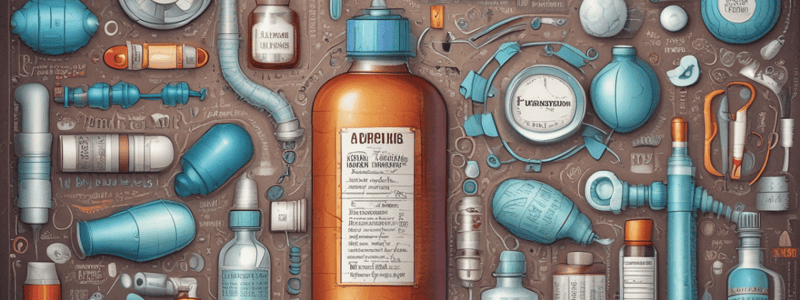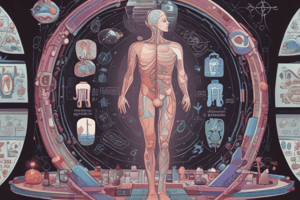Podcast
Questions and Answers
Which of the following medications is a beta-2 adrenergic agonist?
Which of the following medications is a beta-2 adrenergic agonist?
- Albuterol (correct)
- Atropine
- Metoprolol
- Digoxin
Which of the following is a potassium blocker?
Which of the following is a potassium blocker?
- Amiodarone (correct)
- Verapamil
- Diltiazem
- None of the above
Which medication is a phosphodiesterase-5 inhibitor?
Which medication is a phosphodiesterase-5 inhibitor?
- Isosorbide mononitrate
- Metoprolol
- Sildenafil (correct)
- Albuterol
Which of the following medications is an anticholinergic?
Which of the following medications is an anticholinergic?
Which of the following is a glucocorticoid?
Which of the following is a glucocorticoid?
Which of the following medications is a beta blocker?
Which of the following medications is a beta blocker?
What type of insulin has a rapid onset of action?
What type of insulin has a rapid onset of action?
What is the classification of the medication metformin?
What is the classification of the medication metformin?
What type of diuretic is spironolactone?
What type of diuretic is spironolactone?
What is the classification of the medication lisinopril?
What is the classification of the medication lisinopril?
What type of medication is atorvastatin?
What type of medication is atorvastatin?
What is the classification of the medication digoxin?
What is the classification of the medication digoxin?
What type of medication is clonidine?
What type of medication is clonidine?
What is the classification of the medication semaglutide?
What is the classification of the medication semaglutide?
Flashcards are hidden until you start studying
Study Notes
Endocrine
- Rapid acting insulin includes insulin lispro, insulin aspart, and insulin glulisine
- Short acting insulin includes regular insulin
- Intermediate duration insulin includes NPH insulin
- Long-acting insulin includes insulin glargine (U-100) and insulin detemir
- Biguanide includes metformin
- Sulfonylureas include glyburide and glipizide
- Meglitinides include repaglinide and nateglinide
- Thiazolidinediones include rosiglitazone and pioglitazone
- DPP-4 inhibitors include sitagliptin
- SGLT-2 inhibitors include empagliflozin
- GLP-1 agonists/incretin mimetics include semaglutide
Cardio I
- ACE-Is include lisinopril and captopril
- ARBs include valsartan and losartan
- ARNIs include sacubitril-valsartan
- Loop diuretics include furosemide and bumetanide
- Thiazide diuretics include hydrochlorothiazide and chlorthalidone
- Potassium-sparing diuretic includes spironolactone
- Osmotic diuretic includes mannitol
- Cardiac glycoside includes digoxin
- Calcium channel blockers include diltiazem, verapamil, amlodipine, and nifedipine
- HMG-CoA reductase inhibitors include atorvastatin, rosuvastatin, and simvastatin
- Amiodarone has multiple cardiovascular effects
- Alpha-adrenergic blocker includes terazosin
- Beta blockers include propranolol
- Centrally acting alpha 2 agonist includes clonidine
- Nitrates include nitroglycerin, isosorbide dinitrate, and isosorbide mononitrate
- Hydralazine is a direct vasodilator
- Bile sequestrants include colesevelam
- Ezetimibe inhibits cholesterol absorption
- Fibrates include gemfibrozil
Cardio II/Respiratory
- Sodium channel blockers include procainamide and quinidine
- Beta blockers include propranolol, metoprolol, and carvedilol
- Potassium blocker includes amiodarone
- Calcium channel blockers include verapamil and diltiazem
- Atropine is an anticholinergic
- Digoxin is a cardiac glycoside
- Adenosine is used for atrial fibrillation
- Anticoagulants include heparin, enoxaparin, warfarin, dabigatran, rivaroxaban, and apixaban
- Antiplatelets include aspirin, clopidogrel, and ticagrelor
- Thrombolytics include alteplase (tPA)
- Phosphodiesterase-5 inhibitors include sildenafil and tadalafil
- Beta-2 adrenergic agonists include albuterol, formoterol, salmeterol, and terbutaline
- Methylxanthines include theophylline and aminophylline
- Anticholinergics include ipratropium and tiotropium
- Beta agonist/cholinergic antagonist combinations include albuterol/ipratropium
- Glucocorticoids include beclomethasone, fluticasone, and prednisone
- Leukotriene receptor agonists include montelukast
Studying That Suits You
Use AI to generate personalized quizzes and flashcards to suit your learning preferences.




